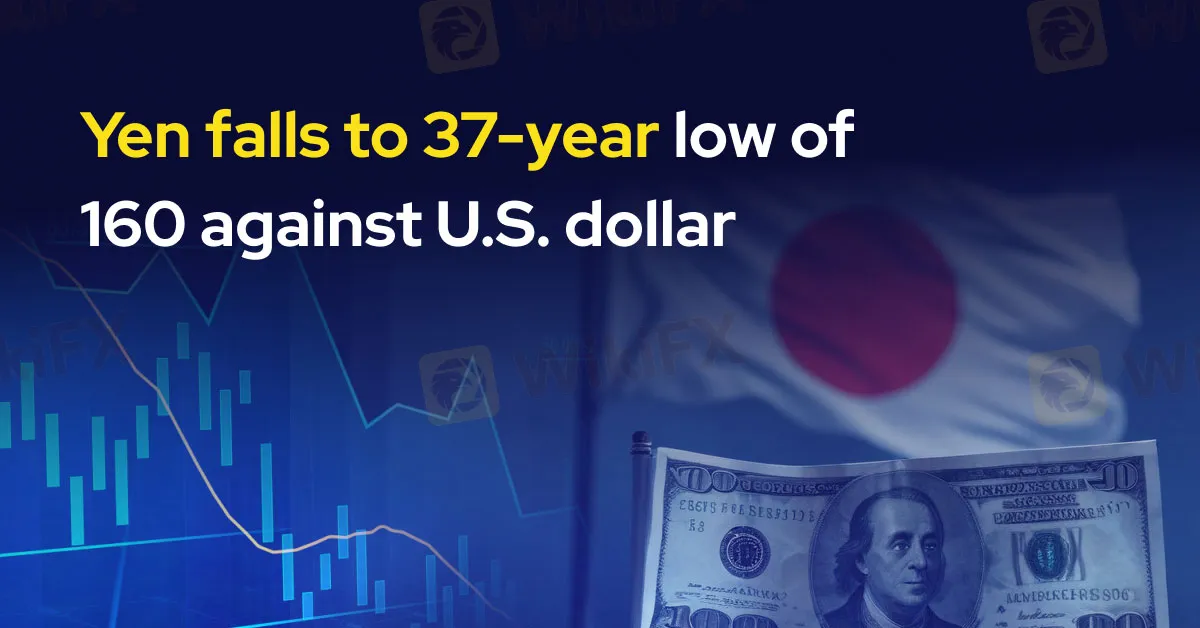简体中文
繁體中文
English
Pусский
日本語
ภาษาไทย
Tiếng Việt
Bahasa Indonesia
Español
हिन्दी
Filippiiniläinen
Français
Deutsch
Português
Türkçe
한국어
العربية
Yen falls to 37-year low of 160 against the U.S. dollar
Abstract:The Japanese yen plummeted below 160 against the US dollar on Wednesday, marking its weakest position in over 37 years. The steep decline has sent shockwaves through Tokyo, prompting urgent discussions on intervention strategies to stabilize the currency.

The Japanese yen plummeted below 160 against the US dollar on Wednesday, marking its weakest position in over 37 years. The steep decline has sent shockwaves through Tokyo, prompting urgent discussions on intervention strategies to stabilize the currency.
The yen's descent below the critical 160 threshold occurred amidst heightened concerns raised by Japanese and South Korean economic forecasters earlier this week. The situation escalated further after the United States added Japan to its watch list for currency manipulation, intensifying global scrutiny.
During London trading hours, the yen touched 160.39 against the dollar, a level unseen since 1986. The alarming drop triggered swift action from Japan's central bank on April 29, when the yen first breached the 160 mark, prompting immediate intervention measures.
Masato Kanda, Japan's vice finance minister, conveyed deep apprehension over the yen's rapid depreciation, emphasizing the government's vigilant monitoring of market trends and readiness to implement necessary countermeasures. “We have a serious concern about the recent rapid weakening of the yen,” Kanda stated, underscoring the urgency of the situation in remarks reported by Bloomberg.
The Japanese government has already committed substantial resources to curb the yen's freefall, spending approximately $61.3 billion in interventions between April 26 and May 29. These efforts involved selling treasuries to stabilize the currency amidst volatile market conditions.
Earlier attempts to bolster the yen, such as the Bank of Japan's first interest rate hike in 17 years in March, have not yielded the desired results. Despite these measures, the yen has continued to struggle against the strengthening US dollar, posing significant challenges for Japan's economic stability and global trade competitiveness.
As Tokyo deliberates on its next steps to address the currency's unprecedented decline, global markets remain attentive to developments that could impact broader economic landscapes. The yen's trajectory in the coming days will likely influence policy decisions in Japan and reverberate across international financial markets, underscoring the interconnected nature of global economies amidst evolving geopolitical dynamics.

Disclaimer:
The views in this article only represent the author's personal views, and do not constitute investment advice on this platform. This platform does not guarantee the accuracy, completeness and timeliness of the information in the article, and will not be liable for any loss caused by the use of or reliance on the information in the article.
Read more

The Impact of Interest Rate Decisions on the Forex Market
Interest rate changes determine currency attractiveness, influencing capital flows and exchange rate trends. Understanding this mechanism helps investors navigate the forex market effectively.

How a Housewife Lost RM288,235 in a Facebook Investment Scam
A 47-year-old housewife in Malaysia recently fell victim to an online investment scam, losing a substantial sum of RM288,235 after engaging with a fraudulent scheme advertised on Facebook.

Interactive Brokers Launches Forecast Contracts in Canada for Market Predictions
Interactive Brokers introduces Forecast Contracts in Canada, enabling investors to trade on economic, political, and climate outcomes. Manage risk with ease.

Bank Negara Malaysia Flags 12 New Companies for Unauthorised Activity
Bank Negara Malaysia (BNM) has updated its Financial Consumer Alert List (FCA List) by adding 12 more entities, reinforcing its efforts to warn the public against unregulated financial schemes. Check if your broker made the list!
WikiFX Broker
Latest News
The Withdrawal Trap: How Scam Brokers Lure Victims into Paying More
FCA to Investors: Think Twice Before Trusting These Brokers
Trump\s tariffs: How could they affect the UK and your money
Trump gambles it all on global tariffs he\s wanted for decades
TradingView Brings Live Market Charts to Telegram Users with New Mini App
Trump tariffs: How will India navigate a world on the brink of a trade war?
Interactive Brokers Launches Forecast Contracts in Canada for Market Predictions
Authorities Alert: MAS Impersonation Scam Hits Singapore
Stocks fall again as Trump tariff jitters continue
IG Group Acquires Freetrade for £160M to Expand UK Investment Market
Currency Calculator







